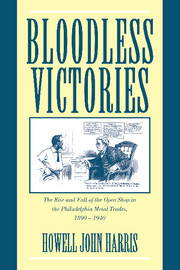Book contents
- Frontmatter
- Contents
- Figures and Tables
- Acknowledgments
- Abbreviations
- 1 Introduction
- 2 The Iron Masters
- 3 Laying the Foundations: Peace and War in the Metal Trades, c. 1890–1904
- 4 Combat, Crisis, and Consolidation, 1904–1915
- 5 “The Largest, Strongest, and Most Valuable Association of Metal Manufacturers in Any City”
- 6 Riding the Storm, 1915–1918
- 7 The War After the War, 1918–1923
- 8 Pacific Passage: Quaker Employers and Welfare Capitalism, c. 1905–1924
- 9 A Liberal Interlude: The Modernization of the MMA, c. 1924–1931
- 10 The Deluge: The Great Depression and the End of the Open Shop
- 11 The New World: Accommodation and Adjustment, 1936–1939
- 12 Afterword: “We'll Still Be There. We're Not Going Away”
- Appendix: Databases Referred to in Text: Nature, Sources, Use
- Index
11 - The New World: Accommodation and Adjustment, 1936–1939
Published online by Cambridge University Press: 21 September 2009
- Frontmatter
- Contents
- Figures and Tables
- Acknowledgments
- Abbreviations
- 1 Introduction
- 2 The Iron Masters
- 3 Laying the Foundations: Peace and War in the Metal Trades, c. 1890–1904
- 4 Combat, Crisis, and Consolidation, 1904–1915
- 5 “The Largest, Strongest, and Most Valuable Association of Metal Manufacturers in Any City”
- 6 Riding the Storm, 1915–1918
- 7 The War After the War, 1918–1923
- 8 Pacific Passage: Quaker Employers and Welfare Capitalism, c. 1905–1924
- 9 A Liberal Interlude: The Modernization of the MMA, c. 1924–1931
- 10 The Deluge: The Great Depression and the End of the Open Shop
- 11 The New World: Accommodation and Adjustment, 1936–1939
- 12 Afterword: “We'll Still Be There. We're Not Going Away”
- Appendix: Databases Referred to in Text: Nature, Sources, Use
- Index
Summary
The crumbling of the MMA's Open Shop policy was no more the result of an ideological conversion to the possible merits of collective bargaining than were the comparable changes taking place at the same time in the business community at large. The Open Shop was simply overwhelmed by a conjunction of mutually reinforcing hostile forces that made the prospects of victory too uncertain, and the costs of resistance too high. The pressure of an apparently unstoppable labor movement enjoying widespread public support, increasingly effective governmental backing, and even some corporate encouragement continued unabated through 1936 and 1937. The time for adopting a new approach that was more in keeping with the requirements of this unwanted New Deal Order had come.
THE ROAD TO REALISM
The process of coming to terms with a new reality was a protracted one. Government agencies played a key role in easing the transition and educating Philadelphia metal-trades executives to the rules of the new game. The Atlantic and Castelli agreements are illustrative here.
First, neither of them was called an agreement, although this was the union's preferred title. They were just “Memorandums of Understanding,” the same term as had applied to the S. L. Allen settlement from 1933 to 1935. In the Atlantic case, neither of the parties concerned was required to sign anything – the state and federal agents alone signed, “attest[ing] to the fact that they were present.”
- Type
- Chapter
- Information
- Bloodless VictoriesThe Rise and Fall of the Open Shop in the Philadelphia Metal Trades, 1890–1940, pp. 405 - 432Publisher: Cambridge University PressPrint publication year: 2000



